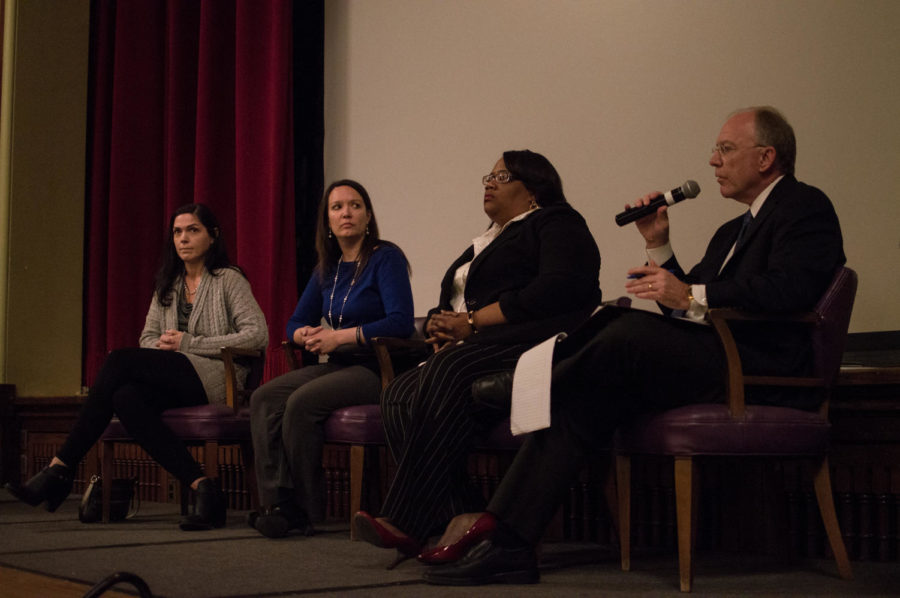Students can voice opinion about ISU sexual misconduct policy
Charlie Coffey/Iowa State Daily
Jerry Stewart, Pamela Anthony, Steffani Simbric and Sara Kellogg lead a discussion with ISU students about sexual assault on campus. The discussion took place April 15 in the Great Hall of the MU.
April 21, 2015
As Iowa State undergoes an investigative visit into its sexual assault procedures this week, students are working to make policy-level change.
Two ISU seniors are organizing an effort to make several changes to Iowa State’s Sexual Misconduct policy. Chelsea Schmidt, senior in linguistics, and Jane Kersch, senior in global resource systems, along with the Society for the Advancement of Gender Equity, will host an open forum Tuesday at 7 p.m. in Curtiss Hall 0127.
“For me, [the point is] making it more accessible to students,” Schmidt said. “I’ve been involved with the Women’s Center for four years, and I still do not understand the university process. It scares me to think that the majority of students on this campus have probably zero idea how to use these resources.”
The students are proposing three categories of changes. First, they are requesting a change in funding. Student fees pay for an on-campus confidential advocate from ACCESS, a Story County organization offering support to victims of sexual and domestic abuse. However, Schmidt says the university doesn’t give money to ACCESS outside of student fees.
“It’s obviously not a priority for them,” Schmidt said. “We want them to fully fund an ACCESS confidential advocate on campus.”
Schmidt also said there is no fully confidential advocate on campus who is easily accessible. Community advisers in residence halls are trained to deal with sexual assault situations, but they cannot keep a student’s experience confidential. Although ACCESS provides a confidential resource for students, its office is in the Armory Building — the same building as the Iowa State Police Division.
“If [victims] don’t want to call the police, why would they go look for a confidential office in the police station?” Schmidt said.
Second on the list of demands are changes to the policy itself: “Sexual Misconduct, Sexual Assault and Sexual Harassment Involving Students.”
Under this policy, punitive measures are mentioned, but there are not specific punishments given for specific infractions. For Schmidt, that’s not enough.
“There is no transparency,” she said. “Basically the policy says if you’re found guilty you’re going to be punished, but it doesn’t say how. What would constitute expulsion?”
Sexual assault cases are decided on a case-by-case basis, but Schmidt said she thinks that at the very minimum, a student who has been found guilty of raping another student should be immediately expelled. And currently, the policy doesn’t reflect that.
Punishments at Iowa State might involve expulsion or suspension, but also might include a deferred suspension, Schmidt said, where students carry out their suspension at a later date.
“Some schools even expel upon graduation,” Schmidt said.
Interestingly, although there were a total of 39 forcible sex offense reports between 2011 and 2013, since 2010, there have only been nine students found responsible under the sexual misconduct policy, said Sara Kellogg, director of judicial affairs.
However, the Office of Judicial Affairs cannot disclose what violations were made or what punishments were given. In fact, the policy covers 27 different student conduct code violations.
“Are all of these things charged the same? Is [forced] sexual intercourse always charged the same?” Schmidt asked. “We don’t know. We have no idea.”
Making punishments more clear would make Iowa State look better, Schmidt said, because it would show the university is taking sexual assault seriously. It would also provide reassurance to victims who report their experiences, and those accused of committing sexual assault would be able to better understand the punishment process.
Finally, the Society for the Advancement of Gender Equity is requesting that Iowa State provide a tab on AccessPlus containing straightforward information about sexual misconduct and student resources.
“Honestly, if you asked the majority of students how they’d report it if they were sexually assaulted, most students wouldn’t know,” Schmidt said.
Tom Hill, senior vice president of student affairs, said he isn’t sure there are policies and procedures in need of revision, but he says it’s a good idea for students to have the opportunity to voice their opinions.
“[The sexual misconduct policy] is designed to help students. That’s the purpose,” Hill said. “If it is not doing that, we need to know it.”
Hill said the forum “can’t hurt” efforts to improve the student experience at Iowa State.
“Whatever students choose to share, we will learn from it,” Hill said. “We will potentially get some great information out of this, but on the flip side, students will get some great information.”
Hill said he will attend the student-run forum, adding that other administrators will be there if their schedules allow.
The open forum will begin with a brief introduction and presentation by SAGE, followed by a period of discussion for students to share their concerns or suggestions.

















